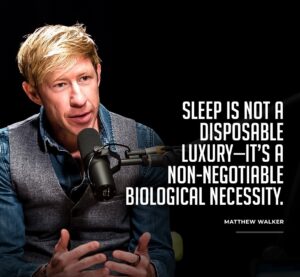《自律養生實踐家之旅368》 無法妥協的生物需求

許多新名詞,不曾出現在任何文獻或資料庫中,卻在「自律養生」的環境裡一再被提及。
創造這些名稱,不是為了標新立異,而是為了讓學習變得更清晰。
以「身體的時間軸」為例,這是為新學員的入門解說、也為老學員的複習所準備的核心概念。真正的理解,卻總要等到學員歷經深度的身體對話、熟練斷食之後。
再以「身體意識」為例,重點並不只在認知,而是提醒人們:身體有自己的思考與立場。唯有長期與身體同在的人,才會自然養成這種思考視角,學會對身體將心比心,尊重它的意願與決定。
就在用身體視角講述「休耕」與「暫停鍵」之後,「生物設定」這個名稱浮現。它的出現,是因為意識到:在身體內部存在著一條不可侵犯的法則。
大夜班、日夜顛倒的生活與疾病的強烈連結,曾給我極深的震撼。我因此清楚:晝夜節律就是生物設定的基準,那是身體運作與平衡的根基。
我不只一次記錄科學家對身體發出的讚嘆,對於生物設定出現不可思議的肯定,總覺得這是人類重新學習信任身體的起點。
此刻,請你也回想:在你有限的人生歲月中,哪些事件、哪些人物,曾讓你深刻體會到「無法妥協」?
也許你會想到公司裡一位權威的大老闆,或想到法庭上不可更改的法律條文。老闆是人,法官也是人,人在人情在,仍有討價還價、情理酌量的餘地。
唯有「生物設定」,才是真正無法妥協的底線,因為晝夜節律不可變動,因為自然法則不可違逆。
當我第一次聽見「睡眠是一種生命支持系統」這句話時,內心強烈回應。你的直覺會選擇懷疑?相信?還是臣服?或者你會聯想到自己的身體異常,因為你正是那個長期忽視睡眠的個案。
這句話的提出者,是《為什麼要睡覺》(Why We Sleep)的作者、睡眠研究學者馬修.沃克(Matthew Walker)。
他將睡眠定義為「無法妥協的生物需求(Nonnegotiable Biological Necessities)」。這個用詞,曾深深撼動我。
我精讀這本書,聆聽他的演講,直到這句話完全嵌入我的價值體系。從此,我嚴厲拒絕不足的睡眠干擾我的健康。
睡眠的不可妥協,為我打開剖析疾病的新窗口。輕視睡眠的後果,正好解釋了許多過去無法解釋的疾病模式。
從睡眠的不可妥協出發,我開始檢視人類其他行為:配方奶粉市場的龐大需求,提醒我們曾輕忽母乳的生物設定;剖腹產率的飆升,證明我們對自然生產的過度干預;濫用抗菌概念導致過敏氾濫;對脂肪的誤解引來心血管疾病的報復。
每一次偏離生物設定,人類都付出代價。臣服於生物設定,不是屈服,而是重新與身體合作。
於是,我更堅信「無法妥協」的鐵則。斷食,不只是與飢餓感的拔河,而是協助身體重建平衡的回程,是人類撥亂反正的機會。
馬修.沃克曾用過兩種不同的說法來形容睡眠:早期,他稱它是「可取捨的奢華生活方式(optional lifestyle luxury)」;後來,他改用更直接的字眼:「一次性的奢華(disposable luxury)」。
他深知人們如何視睡眠為可犧牲、可切割的時間,他深知問題的嚴重性。
當研究揭示膠淋巴系統(glymphatic system)在睡眠中清除腦中毒素的關鍵角色,我再次聽見學者的驚嘆,熱愛學習的我,全然臣服。
我因此明確:斷食與睡眠,同樣屬於「無法妥協的生物需求」。
除了讚嘆身體是「進化的極品」,我也以「身體無所不能」回應造物主的創意。
斷食不是萬靈丹,但它是我們找回身體智慧的途徑。因為每個人信任身體的深度不同,執行的廣度也不同,
可以確定的是:身體之道提供全方位的養生解方,那是我們身上無可取代的寶藏,是進化留給我們的生存能力。
(睡眠不是可有可無的奢侈品,而是不可妥協的生理必需。)
Nonnegotiable Biological Necessities
Many of the terms I use have never appeared in any literature or database, yet they are repeatedly mentioned within the environment of Selfasteam.
I did not coin these terms to be clever or novel, but to make learning clearer.
Take “the body’s timeline” as an example: it is a core concept I use to introduce new students and review with experienced ones. But genuine understanding always comes after they have experienced deep dialogue with their bodies and practiced fasting with some proficiency.
Or take “body consciousness.” The point is not merely cognitive recognition, but a reminder: the body has its own thinking, its own standpoint. Only those who have spent a long time being truly present with their bodies will naturally develop this perspective — learning to empathize with the body, to respect its will and its decisions.
It was after speaking about “fallow periods” and “the pause button” from the body’s perspective that the term “biological settings” surfaced. Its emergence came from realizing that there is an inviolable law operating within the body.
—
The Law of Biological Settings
The strong link between graveyard shifts, disrupted circadian rhythm, and disease once left me deeply shaken. It made me crystal clear: circadian rhythm is the baseline of our biological settings — the foundation of the body’s operation and balance.
I have documented more than once the awe scientists express toward the body, their almost reverent confirmation of its biological settings. To me, these moments are the starting points for humanity to relearn how to trust the body.
So let me invite you to reflect:
In your finite lifetime, what events, what people, have made you feel — with absolute certainty — that something was “nonnegotiable”?
Perhaps you think of a powerful CEO, or of the immutable text of the law in a courtroom. A boss is human, a judge is human — where there are humans, there is room for bargaining, discretion, or leniency.
But biological settings are the true, nonnegotiable bottom line. Circadian rhythm cannot be altered. Natural law cannot be violated.
—
When Sleep Became Sacred
When I first heard the phrase “Sleep is a life-support system,” something in me resonated fiercely. Would your instinct be to doubt? to trust? to surrender? Or would it trigger the memory of your own physical issues — because you are that person who has long ignored sleep?
The person who said this was Matthew Walker, sleep researcher and author of Why We Sleep.
He defined sleep as a “nonnegotiable biological necessity.” Those words shook me profoundly.
I read his book thoroughly, listened to his talks, until the phrase became embedded in my own value system. From then on, I strictly refused to let insufficient sleep compromise my health.
The nonnegotiability of sleep opened a new window for me to analyze disease. The consequences of disregarding sleep explained many illness patterns that previously seemed inexplicable.
—
Beyond Sleep: Returning to the Body’s Law
Starting from the nonnegotiability of sleep, I began to examine other human behaviors:
The massive demand for formula milk reminds us how we have neglected the biological setting of breastfeeding.
The skyrocketing rate of C-sections shows how excessively we interfere with natural birth.
The overuse of antibacterial products has led to the epidemic of allergies.
The vilification of fats has invited cardiovascular backlash.
Every deviation from biological settings exacts a price from humanity. To submit to biological settings is not to surrender — it is to cooperate with the body anew.
This is why I am even more convinced of the iron rule of “nonnegotiability.”
Fasting is not merely a tug-of-war with hunger; it is the homeward journey that helps the body rebuild equilibrium — humanity’s opportunity to set things right again.
—
The Body’s Greatest Gift
Matthew Walker once used two different phrases to describe sleep. Early on, he called it an “optional lifestyle luxury.” Later, he replaced it with the starker “disposable luxury.”
He knew all too well how people treat sleep as negotiable, as a block of time that can be sacrificed and carved away. He knew the gravity of the problem.
When research revealed the glymphatic system’s crucial role in clearing toxins from the brain during sleep, I once again heard scholars gasp in awe — and as a lifelong learner, I surrendered completely.
It became undeniable to me: fasting and sleep both belong to the category of “nonnegotiable biological necessities.”
Beyond marveling at the body as “an exquisite masterpiece of evolution,” I find myself responding to the Creator’s brilliance with this declaration: the body is capable of everything.
Fasting is not a panacea, but it is the path by which we recover the wisdom of the body. And because every person’s trust in their body is different, the depth and breadth of their practice will differ.
One thing, however, is certain: The Way of the Body offers a holistic key to health — an irreplaceable treasure within us, an evolutionary gift for survival.


